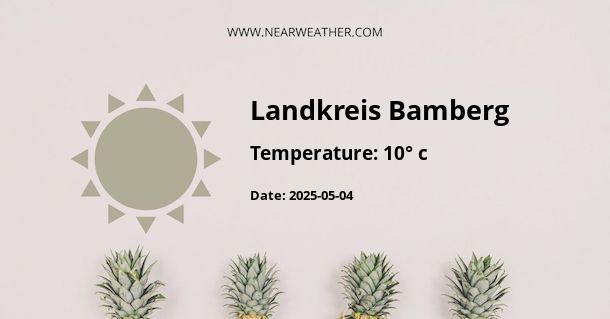Exploring the Climate and Weather of Landkreis Bamberg, Germany
The Landkreis Bamberg, situated in the Upper Franconia region of Bavaria, Germany, boasts a climate that is largely moderate and tempered. It is characterized by four distinct seasons, each with its unique weather patterns. In the following comprehensive overview, we delve into the climatic nuances of this German district, detailing its weather variations throughout the year.
Geographical Influence on Climate
Landkreis Bamberg’s geography plays a significant role in its climate. The region is bordered by the Steigerwald and Haßberge hills to the west and the Franconian Jura to the east. This topography influences the weather, often leading to microclimates within the district. The Main River also contributes to the region's climate by providing moisture that can affect local weather conditions.
Seasonal Climate Patterns
The climate in Landkreis Bamberg is classified as a humid continental climate (Dfb) according to the Köppen-Geiger climate classification. This type of climate typically has warm summers, cold winters, and precipitation fairly distributed throughout the year.
Spring
Spring in Landkreis Bamberg sees a gradual increase in temperature. The region comes alive with vibrant blooms and the temperatures range from lows of around 2°C (36°F) in early spring to highs of approximately 18°C (64°F) by the end of May.
| Month | Average Low (°C) | Average High (°C) | Precipitation (mm) |
|---|---|---|---|
| March | 1 | 10 | 40 |
| April | 4 | 15 | 50 |
| May | 8 | 20 | 70 |
Summer
Summer is the warmest season with daytime temperatures often climbing above 25°C (77°F) in July and August. However, this is also the time for more significant rainfall events, which may occasionally lead to heavy showers or thunderstorms.
| Month | Average Low (°C) | Average High (°C) | Precipitation (mm) |
|---|---|---|---|
| June | 12 | 23 | 80 |
| July | 14 | 25 | 90 |
| August | 14 | 24 | 85 |
Autumn
Autumn sees the cooling of the weather with a noticeable decrease in temperature starting in September through November. The landscape is filled with picturesque foliage, as the temperatures begin to drop ahead of the winter season.
| Month | Average Low (°C) | Average High (°C) | Precipitation (mm) |
|---|---|---|---|
| September | 10 | 20 | 65 |
| October | 6 | 14 | 55 |
| November | 2 | 7 | 50 |
Winter
Winters are generally cold with average temperatures often hovering around freezing. Snowfall can occur, especially from December to February, blanketing the region in white. Frost and icy conditions are common, and daylight hours are considerably shorter during this season.
| Month | Average Low (°C) | Average High (°C) | Snowfall (cm) |
|---|---|---|---|
| December | -1 | 4 | 20 |
| January | -2 | 3 | 25 |
| February | -2 | 4 | 20 |
Year-Round Weather Events
Apart from the standard seasonal changes, Landkreis Bamberg experiences several weather events throughout the year. Notably:
- Springtime brings the possibility of late frosts, which can be detrimental to early blossoms and tender vegetation.
- Summer thunderstorms, sometimes severe, are not uncommon and can cause temporary disruption due to heavy rainfall and, in some instances, hail.
- Autumn often sees foggy mornings, particularly in areas close to the Main River, as cooler air meets the warmer water surfaces.
- Winter snowfall, though moderate most years, can lead to beautiful scenes but also to travel disruptions and increased risk of accidents on icy roads.
Expert Opinions and Adaptation to Local Climate
Professor Jürgen Marko, a climatologist at the University of Bamberg, emphasizes the importance of understanding local microclimates for agriculture and urban planning. The region's diversity in elevation and proximity to rivers require tailored approaches to crop selection and infrastructure development.
"It's crucial for the residents and planners in Landkreis Bamberg to stay informed about the climatic conditions specific to their immediate surroundings. This understanding can mitigate potential negative impacts of weather extremes and take advantage of the beneficial aspects of our diverse climate."
Climate Change Considerations
Like many regions worldwide, Landkreis Bamberg is not immune to the effects of climate change. Rising average temperatures and altered precipitation patterns are ongoing concerns. Studies have shown shifts in the timing of seasons and increased frequency of extreme weather events, which necessitate proactive climate adaptation strategies.
Conclusion
In conclusion, Landkreis Bamberg's climate is dynamic, with seasonal variations that play a significant role in the region's natural beauty and day-to-day life. By remaining aware of these patterns and the potential influence of climate change, both residents and visitors can better prepare for and appreciate the weather in this picturesque part of Germany.
A - Landkreis Bamberg's Latitude is 49.908058 & Longitude is 10.968330.
A - Weather in Landkreis Bamberg is 0° today.
A - Climate Conditions in Landkreis Bamberg shows overcast clouds today.
A - Humidity in Landkreis Bamberg is 99% today.
A - Wind speed in Landkreis Bamberg is 5.9 km/h, flowing at 99° wind direction. today.
